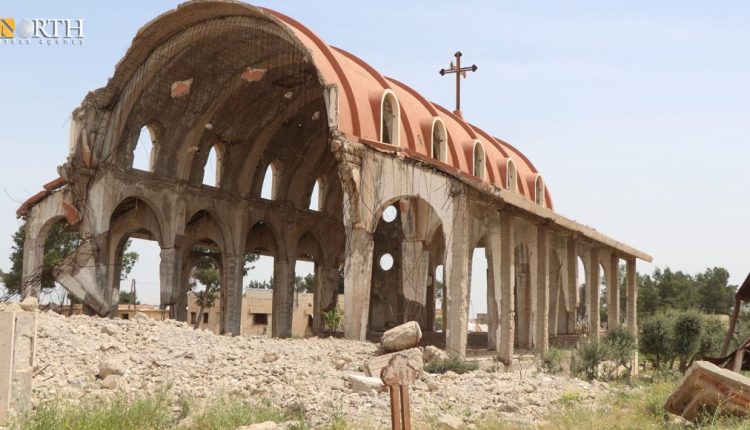
By Samer Yassin
QAMISHLI, Syria (North Press) – As some countries repatriate their nationals who had joined the Islamic State (ISIS), one question weighs heavily on the minds of the Assyrians who suffered at the hands of the group in Northeast Syria, “Where is justice?”
According to statistics carried out prior to the Syrian conflict and ISIS attacks on the region where Assyrians lived, more than 25,000 Assyrians lived in the country, including 8,000 in the town of Tel Tamr in the northwest of Hasakah, northeastern Syria, and areas on the banks of al-Khabur River. Now, only 1,000 Assyrians remain there.
In early 2015, ISIS attacked Christian villages on the banks of al-Khabur River in Tel Tamr and took control of 33 Assyrian villages for over three months. The group killed and abducted around 280 Assyrians, including more than 50 children and 100 women. ISIS destroyed seven churches in those villages, including St. Mary Church in the village of Tel Nasri, which was a significant religious destination for Assyrians in Syria.
The Autonomous Administration of North and East Syria (AANES) handed over dozens of ISIS members who came from the U.S., Europe and Arab states. The process of repatriating ISIS members continues despite the reluctance of some countries.
War crimes
Dawood Talya, 64, recalls when he was kidnapped by ISIS. He stresses that a person who has been indoctrinated with terrorism cannot forget it or change even if he remains in prison for hundreds of years. They will return to their activities at the first opportunity that arises.
Talya and his wife and daughter were kidnapped for a year by ISIS when they attacked his village, Tel Shamiran in the northwest of Hasakah. Later, ISIS moved them to Mount Abdulaziz in the southwest of Hasakah, then to the town of Shaddadi and then Raqqa when they were controlling those areas back then.
Talya tells North Press that “A leopard never changes its spots,” emphasizing that ISIS members who were not prosecuted carry out terrorist acts again, like they did when they had an opportunity in al-Sinaa prison in Hasakah and started killing again.
Talya points out those individuals must be tried in courts under international supervision because they committed war crimes in Syria, especially in Assyrian villages.
Additionally, they engaged in kidnapping, capturing, and killing civilians, causing the displacement of thousands of people, especially from the Khabur valley, Talya added.
He calls on the U.S., Russia, and the U.S.-led Global Coalition to Defeat ISIS to prosecute those members because they are the main reason for the immigration of Assyrians, as only 700 people are present now in the area.
Heavy price
Ziyad Yaqoub, 60, an Assyrian who survived ISIS, rejects the repatriation of ISIS members without a trial that ensures the rights of the Assyrians, who paid a heavy price and were subjected to killings, kidnappings, displacement, and destruction of churches.
Yaqoub hails from Tel Nasri in the countryside of Tel Tamr, which used to host thousands of Assyrians before ISIS destroyed their church. He told North Press that there should be real guarantees by parties involved in repatriations.
“We paid a heavy price and lost many martyrs. Our homes and villages have been destroyed and have been forcibly displaced from our land. The perpetrators of these actions must face consequences,” he says.
Yaqoub adds that when they hear that some states repatriated their nationals who joined ISIS, they feel their rights are violated. “Negotiators should take real guarantees that these countries will hold these individuals who committed war crimes accountable,” he said.
Yaqoub warns that they can be regrouped and used in another geographical location or even in the same location, as he puts it.
Trial integrity
Sargon Salyo, an Assyrian from Tel Nasri, says, “Who will bear the cost of the damage and the precious lives that were lost defending these villages and churches? Who will compensate for the moral value of the displaced people, a value that cannot be measured in any amount of money? Who will shoulder the responsibility for the destruction of buildings and churches.”
Salyo believes the continued presence of ISIS members in the region without being held accountable is unjust. He said they pose a great danger and are like a ticking bomb due to their large number, estimated in tens of thousands. But, handing them over to their countries without trial is also unfair because there are no guarantees that these trials are impartial.
Salyo adds that when they hear about repatriations without trial, they become agitated and feel they have been wronged because they doubt the governments of their original countries would conduct a fair trial for the crimes they committed against the people in the region.
He calls on relevant authorities to hold trials for these individuals to prevent a repetition of what happened in the past. He believes the Assyrian people suffered the most because of the massacres, killings, and destruction along the Khabur valley.
